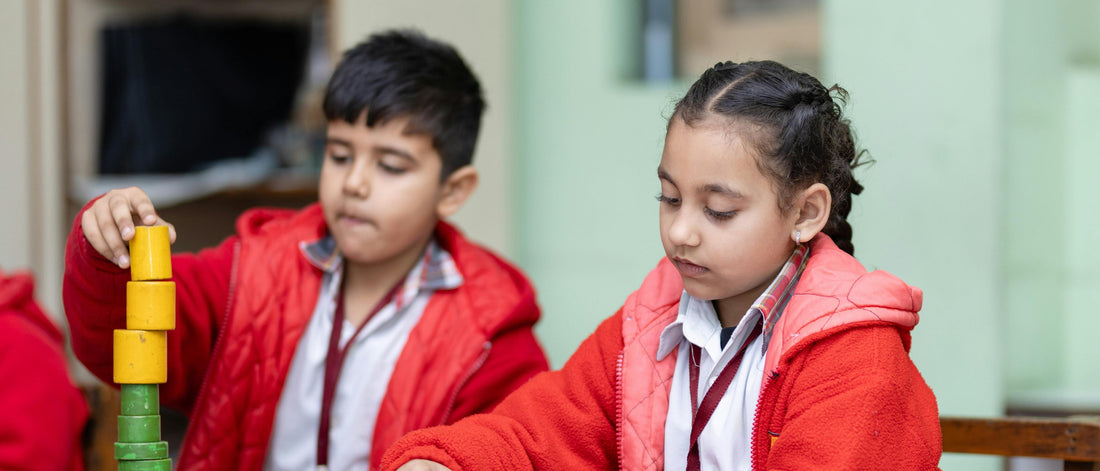
Struggling to Keep Your Child Engaged in School? These 5 Natural Ways will Boost Your Child's Focus & Interest.
Share
If your child struggles to focus, avoids homework, or seems disconnected from learning, know that these challenges are more common than they may seem. Today’s fast-paced, screen-filled world can overwhelm your child.
This blog gently guides you through the common causes of attention issues in children and offers five simple, natural, science-backed habits to help boost focus, improve mood, and support better school performance, starting with small, daily changes that truly make a difference.
Key Symptoms and Warning Signs Parents Should Watch For
If you're searching for “how do I know if my child has focus issues?” or “early signs of attention problems in kids,” the symptoms listed below can help you spot the signs early and take supportive steps.
- Child not paying attention in class
- Easily distracted and forgets daily tasks
- Doesn’t follow instructions or finish homework
- Frequently loses books or personal items
- Constant fidgeting or trouble sitting still
- Interrupts, blurts out answers, can’t wait their turn
- Avoids homework or tasks that require focus
- Very difficult to eat or extremely picky with food
If several of these signs feel familiar, your child may be signaling a need for support, not discipline.
Doctor’s Note:
Focus issues in children are increasingly common, but often manageable with the right approach. I encourage parents to begin with natural, supportive strategies. A nurturing environment, balanced nutrition, and healthy routines can make a meaningful difference in your child’s attention, behavior, and overall well-being.
Why Kids Struggle to Focus: The Science and Root Causes of Attention Problems in Children
Why do children lose interest in school? It’s a question many parents ask and the answer often starts with the brain.
Your Child’s Brain Is Still Developing
The prefrontal cortex is the part of the brain that controls focus, impulse control, and planning. Research shows that this area is one of the last to fully mature in children Li et al., 2014; PMC, 2014). Because it’s still developing, kids may find it naturally harder to stay organized, sit still, or follow multi-step instructions, especially in high-pressure settings like school.
Dopamine and Serotonin Imbalance in the Child’s Brain
Two key neurotransmitters - dopamine and serotonin, play a major role in a child’s ability to focus, stay motivated, and process learning.
-
Dopamine is a brain chemical that helps kids stay focused, motivated, and enjoy learning. It’s essential for attention, goal-setting, and academic success.
-
Serotonin is a natural mood-balancing chemical that supports calmness, better sleep, emotional control, and gut health, especially during school stress.
When these brain chemicals are imbalanced or underactive, children may seem bored, restless, inattentive, or easily frustrated, even when they’re genuinely trying. (Volkow et al., 2009; PubMed, 2009)
Nutritional Deficiencies That Affect Focus in Kids
When a child lacks the right nutrients, their brain can’t function at full potential. Deficiencies in iron, magnesium, vitamin B6, and omega-3s are linked to poor concentration, mood swings, and low motivation. The brain also needs amino acids like tyrosine and tryptophan to produce focus-related chemicals like dopamine and serotonin (Daubner et al., 2011)
Undernutrition in early childhood can impact long-term brain function and learning ability (Liu et al., 2003; PMC, 2003)
Lifestyle and Daily Habits Impact Your Child’s Focus and School Performance
Processed Foods & Environmental Toxins Impact Kids’ Focus
Today’s kids are surrounded by ultra-processed foods, additives, and even microplastics—all of which may harm brain development and focus (Rauh & Margolis,2017) . Many snacks lack key nutrients like iron, magnesium, and omega-3s, while being high in sugar and preservatives.
This imbalance can disrupt the gut-brain connection, reduce dopamine and serotonin production, and cause poor concentration, mood swings, and low emotional control.
The gut-brain connection is the two-way link between the digestive system and brain, where gut health plays a key role in mood, focus, and mental clarity in children.
Lack of Physical Activity Reduces Brain Performance
Physical movement increases blood flow to the brain and boosts Brain-Derived Neurotrophic Factor (BDNF)—a protein essential for memory, attention, and cognitive growth (Latomme et al., 2022; PMC, 2022). Kids who sit too long without movement often have trouble staying alert and engaged in school.
Poor Sleep Habits Disrupt Learning and Mood
A study stated that children with less than nine hours of sleep showed measurable differences in brain structure and early signs of mood and thinking challenges—underscoring how poor sleep can directly affect attention, memory, and behavioral control (NIH News in Health, 2022)
Emotional Stress Can Worsen Attention Problems
Children dealing with stress, anxiety, or lack of emotional support may show signs of restlessness, avoidance, or trouble staying focused. Teaching tools like mindfulness, breathing exercises, or creating a calm, supportive routine can improve emotional balance and learning readiness.
“Early intervention with the right nutrition and habits isn’t optional—it’s foundational. The routines we build in childhood shape brain development, emotional resilience, and long-term health outcomes,” says the Founder of BR Nutricure, a pediatrician.
5 Natural Ways to Boost Focus and Increase School Interest in Children
1. Nutrient-Rich Balanced Meals That Help Kids Focus Better
These science-backed nutrients directly support brain development, attention span, memory, and learning:
Protein – A Vital Nutrient for Growth, Brain Health, and Focus
-
What it does: Provides amino acids to make dopamine and serotonin, brain chemicals responsible for focus, mood, and learning. According to ICMR guidelines, growing kids require roughly 1.1 to 1.55 g/kg of body weight/per day
-
Sources: Eggs, milk, lentils, paneer, nuts, and whole grains.
Omega-3 Fatty Acids – For Brain Development
-
What it does: Omega-3s (especially DHA & EPA) support brain development, focus, memory, and emotional balance in growing kids (PMC, 2021). RDA for omega-3 is 100–150 mg of DHA daily for children aged 2–4 years.
-
Sources: Walnuts, flaxseeds, chia seeds, and algae-based DHA (veg); fatty fish like salmon or sardines (non-veg).
Iron – For Mental Energy and Learning
-
What it does: Helps carry oxygen to the brain. Iron deficiency is a leading cause of low attention and mental fatigue. According to the Canadian Paediatric Society, the recommended daily intake (RDA) of iron is
-
1-3 years: 7mg/day
-
4-8 years: 10mg/day
-
9-13 years: 8mg/day
-
Sources: Dates, spinach, jaggery, legumes,
B Vitamins – For Memory and Nerve Function
-
What they do: Especially B6, B9 (folate), and B12 support cognitive function, reduce brain fog, and maintain nervous system balance.
-
Sources: Whole grains, green veggies, bananas, dairy, legumes.
Magnesium – For Calm and Clarity
-
What it does: Calms the nervous system, improves sleep, and helps kids stay emotionally balanced and less reactive.
-
Sources: Nuts, seeds, dark chocolate, bananas, and green leafy veggies.
Quick Tip for Parents: Start by ensuring 2–3 servings of protein, 1 serving of a DHA-rich food, and a variety of vegetables and whole grains daily. Small changes in the lunchbox = big changes in focus!
2. Daily Physical Activities to Improve Focus and Brain Health
Physical activity boosts BDNF (Brain-Derived Neurotrophic Factor): a brain protein that improves learning, memory, and attention.
Even 30–60 minutes of daily play helps reduce restlessness and sharpen focus.
Try:
-
Outdoor games
-
Dance, yoga, or martial arts
-
Jumping, cycling, or active indoor play
Staying active daily builds stronger brain connections and helps kids stay more focused in class.
3. Sleep Affects Focus and School Performance
We know how hard it is when your child just can’t fall asleep—even after a long, tiring day. Tossing and turning for hours, getting out of bed again and again… it’s exhausting for you.
You can Improve sleep by:
-
Keeping consistent bedtime/wake time
-
Turning off screens 1 hour before sleep
-
Creating a calm, dark, quiet sleep space
-
Gentle support with herbs like chamomile or Brahmi, which are known to support natural sleep and relaxation
Better sleep = better focus, fewer meltdowns, and improved school performance.
4. Easy Mindfulness Techniques to Help Kids Focus
Just 5 minutes a day of mindfulness can help your child stay calm, reduce anxiety, and boost attention.
-
4-7-8 Breathing: Breathe in for 4 sec, hold for 7, exhale for 8, calms the mind and lowers stress.
-
5-4-3-2-1 Grounding: Name 5 things you see, 4 feel, 3 hear, 2 smell, 1 taste — brings focus back fast.
-
Mind Jars: Watch glitter settle in a jar, a simple visual tool to reset racing thoughts
“My 6-year-old was restless and struggled to sleep. We made simple changes, more outdoor time, regular meals, and added calming herbs like Brahmi. Slowly, he became calmer, more focused, and happier. Natural changes truly made a difference.”
—Aarti, mother from Delhi
5. Natural Supplements That Support Kids’ Focus, Sleep & Emotional Balance
For some children, daily routines and lifestyle changes aren’t enough on their own. In such cases, gentle, plant-based supplementation can offer additional support, especially when focus issues are linked to restlessness, poor sleep, or emotional imbalance.
-
Brahmi (Bacopa monnieri): Traditionally used to improve attention span, memory, and cognition in children.
-
Chamomile Extract: A soothing herb known for calming the nervous system and improving sleep quality by 81.8% (Huda et al., 2020;PMC, 2022)
-
Valerian Root: Natural support for sleep initiation and reducing nighttime restlessness.
-
L-Tryptophan & L-Theanine: Amino acids that help produce serotonin and GABA - neurotransmitters that regulate mood, focus, and sleep.
-
L-Threonine: Supports the central nervous system and helps reduce overexcitement in children.
These ingredients, when blended in the right proportions, can gently promote calm, focus, and better sleep, without the side effects of synthetic medications.
Formulated by a pediatrician and trusted by parents, BR Nutricure’s gentle blend of Brahmi, Chamomile, Valerian Root, and essential amino acids like L- Tryptophan, L- Threonine supports calm focus, restful sleep, and healthy brain development.
FAQs: What Other Parents Are Asking
Q1: Is it normal for my child to have trouble focusing at their age?
Mild distractibility is common in growing children, especially under age 10. But if it’s affecting school or daily routines, it may need support.
Q2: How much sleep does my child need for optimal focus?
Children aged 6–12 years need 9–11 hours of quality sleep each night. Poor sleep habits are strongly linked to low attention span and behavior issues in kids.
Q3: Can physical activity improve my child’s attention span?
Yes. Daily movement boosts brain chemicals like dopamine and serotonin that improve focus, memory, and behavior. Even 30 minutes of outdoor play or yoga can make a difference.
Q4: When should I seek professional help for my child’s attention issues?
If your child’s lack of focus interferes with learning, friendships, or emotions for more than 6 months, speak with a pediatrician or child psychologist for evaluation.
Q5: How does screen time affect my child’s focus and behavior?
Excessive screen time can reduce dopamine sensitivity, shorten attention span, and disturb sleep. Experts recommend less than 2 hours of recreational screen time daily for children.
Support That Grows With Your Child
Focus issues in children aren’t always a sign of something serious, but they can be a signal of underlying imbalance. With the right daily habits, calming routines, nutrient-rich meals, and gentle natural support, your child’s attention, sleep, and mood can improve over time.
Start small, stay consistent, and trust the process. These early steps build a foundation not just for better school performance, but for lifelong well-being.
Try BR Nutricure Relaxed Syrup - crafted by a leading pediatrician and trusted by parents to help kids feel calm, focused, and ready to thrive.
Start today and support your child’s focus naturally, because small daily changes can lead to big results.


